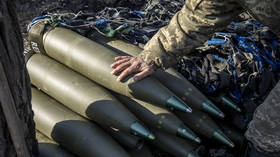Berlin downplays FM’s statement on cluster munitions for Ukraine

A spokesman for the German government has downplayed a statement by Foreign Minister Annalena Baerbock, who stressed Berlin’s opposition to delivering cluster munitions to Ukraine. Washington is expected to greenlight such supplies soon.
Baerbock expressed a negative attitude to the much-criticized weapons during a climate event in Austria on Friday.
“I have followed the media reports. For us, as a state party, the Oslo agreement applies,” she told journalists, when asked about US plans.
The minister was referring to the Convention on Cluster Munitions (CCM), which was signed in the Norwegian capital in 2008 and bans this type of weapons, with a handful of exceptions. Germany is one of the signatories, but the US is not. Cluster weapons tend to leave behind unexploded bomblets that can maim or kill people years after deployment.
Following Baerbock's remark, German government spokesman Steffen Hebestreit said that Berlin was “certain that our US friends did not take the decision to supply the relevant munitions lightly.” He implied that Kiev’s use of cluster weapons to “protect civilians” and to “liberate” territory was morally justifiable.
NATO Secretary General Jens Stoltenberg said on Friday that the US-led military bloc “does not have a position” on such weapons precisely because member states have different views on them. He noted that troops from both Moscow and Kiev already have such weapons, but “Ukraine is using cluster munitions to protect itself against an aggressor.”
Critics of the expected US move, including Human Rights Watch (HRW), disputed the notion that Kiev would be able to mitigate harm to civilians by carefully selecting targets.
“The US government should not be providing cluster munitions to any country due to the foreseeable and lasting harm to civilians from these weapons,” Mary Wareham, the advocacy director of the Arms Division of HRW said.
The US has a large stockpile of Cold War-era artillery shells with cluster warheads. Congressional supporters of Kiev have argued they should be sent to Ukraine and put “to their intended use” to “counter Russia’s numerical and material superiority.”
The Pentagon said it intended to provide Ukraine with munitions that have a lower dud rate – the proportion of bomblets that fail to explode.













